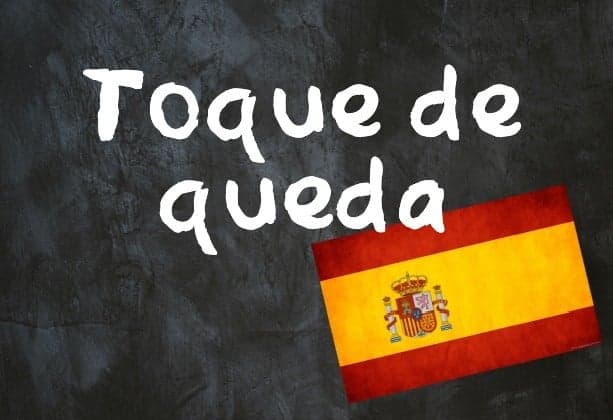Spanish word(s) of the day: 'Toque de queda'

You’ve probably heard these words in the news recently as Spain is planning to impose more restrictions to slow down its second coronavirus wave.
Why do I need to know these words?
If you live in Spain, the chances are that “el toque de queda” is soon going to become part of your daily life.
“Un toque de queda” is of course how you say ‘a curfew’ in Spanish.
Right now, most regions in Spain are considering imposing a “toque de queda nocturno” – or night-time curfew – as a means of stemming the spread of the coronavirus, given that the total number of infections have just reached one million, higher than any country in Europe other than Russia.
Where does the expression come from?
The expression “toque de queda” has its origins in the medieval practice of “couvre-feu”, the act of putting out fires and other lights in old timber houses to prevent a blaze from sweeping through the village as everyone slept at night.
Typically, the village church would chime the tower bell at 8 o’ clock as a reminder.
The French “couvre-feu” became ‘curfew’ in English after William the Conqueror made the practice law in England.
The Spanish expression “toque de queda” doesn't refer to this nighttime fire-extinguishing habit in the linguistic sense, but rather to the need to stay put at home (The Italian word for curfew for example does refer to fire - "coprifuoco").
The “toque”, which in its most literal sense is understood as a touch, ring or tap, refers to the chiming of the bells to announce the start of the curfew.
And the “queda” to the restrictions ("queda" is now a very formal and uncommon way of saying “quiet” or “still”).
So it seems that the Spanish expression for curfew developed more recently, when curfew came to mean a limitation on movement outdoors between certain times.
Interestingly, “queda” on its own can also be a noun meaning 'curfew', but most Spanish people use the full “toque de queda” to refer to a curfew.

Headline in La Vanguardia newspaper reads "The two Castilles, Andalusia and Valencia ask for a curfew"
Can I have some examples?
Acaban de decretar un toque de queda en Granada.
They’ve just ordered a curfew be imposed in Granada.
¿Tienes idea de cuándo van a levantar el toque de queda?
Do you know when they’re going to lift the curfew?
España entera está bajo el toque de queda.
The whole of Spain is under curfew.
READ MORE:
-
Check out our other word of the day posts
-
10 Spanish words and phrases we've learned during the corona crisis
-
The Spanish vocab you need to understand the coronavirus crisis
Comments
See Also
Why do I need to know these words?
If you live in Spain, the chances are that “el toque de queda” is soon going to become part of your daily life.
“Un toque de queda” is of course how you say ‘a curfew’ in Spanish.
Right now, most regions in Spain are considering imposing a “toque de queda nocturno” – or night-time curfew – as a means of stemming the spread of the coronavirus, given that the total number of infections have just reached one million, higher than any country in Europe other than Russia.
Where does the expression come from?
The expression “toque de queda” has its origins in the medieval practice of “couvre-feu”, the act of putting out fires and other lights in old timber houses to prevent a blaze from sweeping through the village as everyone slept at night.
Typically, the village church would chime the tower bell at 8 o’ clock as a reminder.
The French “couvre-feu” became ‘curfew’ in English after William the Conqueror made the practice law in England.
The Spanish expression “toque de queda” doesn't refer to this nighttime fire-extinguishing habit in the linguistic sense, but rather to the need to stay put at home (The Italian word for curfew for example does refer to fire - "coprifuoco").
The “toque”, which in its most literal sense is understood as a touch, ring or tap, refers to the chiming of the bells to announce the start of the curfew.
And the “queda” to the restrictions ("queda" is now a very formal and uncommon way of saying “quiet” or “still”).
So it seems that the Spanish expression for curfew developed more recently, when curfew came to mean a limitation on movement outdoors between certain times.
Interestingly, “queda” on its own can also be a noun meaning 'curfew', but most Spanish people use the full “toque de queda” to refer to a curfew.

Headline in La Vanguardia newspaper reads "The two Castilles, Andalusia and Valencia ask for a curfew"
Can I have some examples?
Acaban de decretar un toque de queda en Granada.
They’ve just ordered a curfew be imposed in Granada.
¿Tienes idea de cuándo van a levantar el toque de queda?
Do you know when they’re going to lift the curfew?
España entera está bajo el toque de queda.
The whole of Spain is under curfew.
READ MORE:
- Check out our other word of the day posts
- 10 Spanish words and phrases we've learned during the corona crisis
- The Spanish vocab you need to understand the coronavirus crisis
Join the conversation in our comments section below. Share your own views and experience and if you have a question or suggestion for our journalists then email us at [email protected].
Please keep comments civil, constructive and on topic – and make sure to read our terms of use before getting involved.
Please log in here to leave a comment.